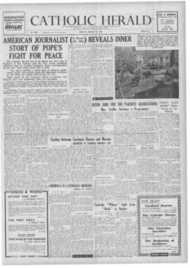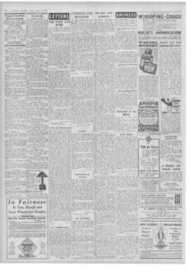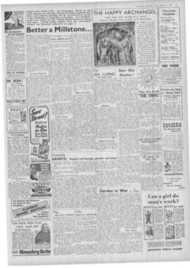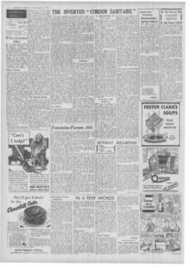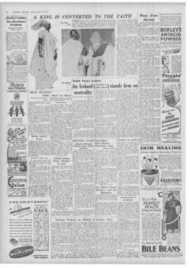Page 6, 24th March 1944
Page 6

Report an error
Noticed an error on this page?If you've noticed an error in this article please click here to report it.
Tags
Share
Related articles
Irish News Letter
Ireland And Invasion
Irish News Letter
Irish News Letter Eire . Decides What Is Propaganda
Irish News Letter
Irish News Letter •
An Ireland (EsZthilcresth.) stands firm on neutrality
From Our Own Correspondent
DUBLIN
The American and Irish Notes produced by far the biggest sensation affecting. Ireland since the
war. The effect in Ireland was electrical in swiftness and intensity. A few days earlier all Party leaders in the Dtlil had expressed their unity with the Government policy in neutrality—as re. ported in this newspaper last week— but now there was an uprising of national unanimity from end to end of the island, and people of the most diverse interests declared their support of the Government.
Thus, the Irish Times, the qrgan of the strongest Unionist and Protestant elements, South and North, a paper which has criticised Mr. de Valera in almost all his domestic policies and that never has disguised its whole. hearted sympathy with British Imperial ideals, rrote:
" Let us say immediately that Mr. de Valera had no logical alternative to the course which he has taken. Representing a small people he was bound to refuse to accept dictation from any outside Power. however friendly that Power might be . We cannot say that the section of the Irish people whom we may claim to represent is wholly indifferent to the outcome of the war. We can say with complete sincerity that it is wholeheartedly loyal to its own Government."
The Bishop of Cloghes, speaking immediately after the publication of the Notes, condemned the American action as tending to force Ireland willynilly into the war. If the Axis representatives were expelled the only way to remain neutral would be to send away also the representatives of the United Nations. In view of the justice of the Irish cause, and the unanimous desire for neutrality. the whole people would support the Government's action, come what may.
These. words from Dr. O'Callaghan are the words of a most conservative Churchman ; and this youngest of our Bishops may be taken as expressing the mind of the Hierarchy and clergy.
FEAR OF A BREACH
Gratifying as it is to behold Ireland calm and utterly unanimous, everyone wishes that the stimulus to patriotic steadfastness had not come from Power that we always have regarded in the light of a friend and champion. Indeed, the anxiety that reigned during the fortnight of rumour was not on material grounds alone, but from fear of a breach that would undo the healing work or recent years.
This is the reason for the Government's approach to the Australian and Canadian authorities. in the hope to obtain through their good offices the quashing of the regrettable correspondence. It also is the key to the most important passage in Mr. de Valera's Note, that in which be spoke of the great change that had come over Irish sentiment towards Britain in the war years. Britain's honourable respect of Irish neutrality was the cause of this happy development. and he thought that Americans must deplore any action that might undo the good work. Note: this development in Ireland has been stressed repeatedly in this newspaper during the last years. and it will be remembered that the Editor. in his impressions of Ireland in 1942, was particularly insistent on the cordiality towards Britain that he met everywhere, and that he correctly traced to the respect of Irish independence. In the darkest period of Britain's fortunes, there were rumours of designs against Irish neutrality. As these successively were falsified the older suspicions were dispelled from the Irish mind. Hence the young men who have come to manhood as soldiers of a free 141and appreciate the stand that the national leaders marked out—relations with England governed by mutual respect ; Britain recognising Ireland's freedom and Ireland guaranteeing with all her strength the inviolability of this land.
DEFENCE—NO SECRET
One aspect of the presence of a German embassy in Dublin seems to have escaped notice. It was common knowledge in the first two years of the war that a certain element, disloyal to the national government and policy— those who so gravely damaged AngloIrish relations by the irresponsible campaign of explosions—had tried to bring about intervention in Ireland by Britain's enemy.
Now, if this element received any heed, there was one channel by which any plot to invade Ireland from the Continent must have received discouragement. The truth that the armed manhood of Ireland was alert and determined to fulfil its obligation of defence to the uttermost needed 'no spies to discover it : the behaviour of the splendidly efficient and enthusiastic defence forces was the molt manifest thing in the Irish scene.
Therefore, the one piece of undesirable news that Germany's representative must -have reported to his Government was that any attempt to strike England through Ireland would get no Irish support, but would bring the most tenacious of fighting races into the field, to bleed to the last drop if needs be, to destroy any violator of Irish freedom and Irish honour.
Apart from all other considerations, therefore, one believes that the presence of the Axis embassy in the neutral land must have rebounded, however unexpectedly, to the interests even of Britain., helped to ensure the neutralisaion of an area that otherwise would have been a burning danger.
NO EVIDENCE OF ESPIONAGE
There was satisfaction in Ireland when Mr. Cordell Hull admitted that no evidence of past espionage in Ireland was alleged. It can be affirmed that British and American interests in this matter, safeguarded by the extreme vigilance of the Government, are made triply safe by the loyalty of the people in the Twenty-six Counties to their rulers. In the self-governing part of Ireland the conditions essential to a watertight prevention of espionage exist ; for every citizen is, so to speak, a policeman in the protection of the common interest.
This was demonstrated in the incident of the parachutists, who landed On some mischief-making enterprise. In an unfree Ireland no one can say what would have followed In territory ruled by a native Government. loyally and unanimously upheld by the people, these presumptive spies were rounded up instantly and their plans frustrated.
This is the state of affairs that may not be appreciated in America, several thousand miles aloof from Irish reality Surely. however, prudent English minds—minds of Englishmen as weary as Irishmen of former strife between these islands—must realise that the best investment for legitimate British interests ever made in Ireland is Irish freedom.
It has not been abused. It will not be. On the understanding of this, permanent relations of friendship and mutual safety rest.
San Domingo recently celebrated the centenary of its independence. The Pope bestowed the Apostolic Benediction on the entire people and expressed his sincere good wishes in a message.
blog comments powered by Disqus


